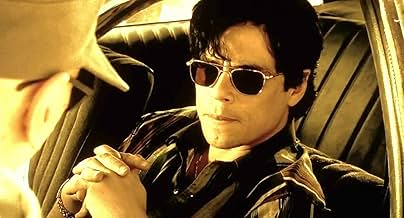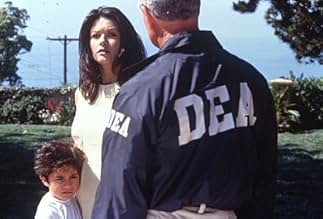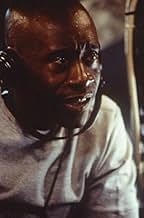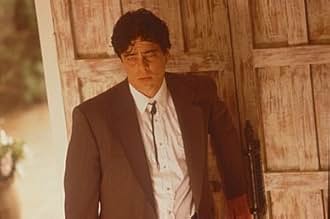El presidente nombra a un juez conservador para encabezar la creciente guerra de Estados Unidos contra las drogas, pero descubre que su hija adolescente es una adicta al crack.El presidente nombra a un juez conservador para encabezar la creciente guerra de Estados Unidos contra las drogas, pero descubre que su hija adolescente es una adicta al crack.El presidente nombra a un juez conservador para encabezar la creciente guerra de Estados Unidos contra las drogas, pero descubre que su hija adolescente es una adicta al crack.
- Dirección
- Guionistas
- Elenco
- Ganó 4 premios Óscar
- 73 premios ganados y 86 nominaciones en total
- Salazar Soldier
- (as Jose Yenque)
- …
- Dirección
- Guionistas
- Todo el elenco y el equipo
- Producción, taquilla y más en IMDbPro
Opiniones destacadas
Traffic takes on the complex issues involved with the war on drugs in the United States and Mexico from the view of these nations as a whole to the very personal level. In the film, three stories unfold to illustrate the near impossibility of ever stopping the drug trade, despite the billion dollars that the US spends each year for just that cause. While the tales are related, the characters rarely, if ever, cross paths with one another. This is one of the elements that allows Soderbergh to deliver his message so effectively.
The first story features Benicio Del Toro as Javier Rodriguez Rodriguez. A cop in Baja, Mexico, he enforces the law and allows the wheels to be greased from time to time. After pulling off a huge drug bust on the Juarez drug cartel, the powerful General Salazar swoops in to confiscate all of the drugs and the credit. Later, Javier and his partner are recruited by Salazar to fight the war on drugs by aiding him in bringing down the Obregon cartel that has plagued Tijuana for some time.
Meanwhile, back in the States, Judge Robert Wakefield (Michael Douglas) of the Ohio Supreme Court is about to be appointed by the President as the nation's new leader in the drug war. For the judge, the drug war is about to become more personal than he could ever have imagined.
In San Diego, Monty (Don Cheadle) and Ray (Luis Guzman) are two federal agents perpetrating a drug bust on a slimy drug supplier named Eduardo Ruiz (Miguel Ferrer). The events that follow lead them up the drug food chain to Carlos Ayala, a well-to-do suburban man who has been smuggling illegal drugs into the country from Mexico. His arrest leaves his pregnant wife, Helena (Katherine Zeta-Jones, who was really pregnant during the film), to fend for herself while taking care of their son, court costs, and a $3 million dollar debt to the drug lords in Mexico.
Traffic, written by Simon Moore (the writer for the British miniseries, Traffik, upon which this script is based), is superbly crafted and woven. We learn just enough about each character to give us some insight into their motives for the courses they choose to follow. By the films end, matters are not neatly wrapped up; there is not a fairy tale ending. This simply adds to the realism of the issues presented within the movie. Furthermore, the intertwining stories drive home the fact that drugs are closer to you than you think.
The script is bolstered by the phenomenal, ensemble cast. Zeta-Jones and Del Toro have both received Golden Globe nominations for Best Supporting Actress and Actor in a drama for their roles in this film. Don Cheadle is superb in his role. Michael Douglas gives his usual performance while Erika Christensen does a good job as his daughter. Topher Grace (of TV's That 70's Show) is excellent as her upper-class, druggie boyfriend. Dennis Quid's character, while played adequately, is underused.
The stories were shot using various filters and lenses, neatly separating them as the film went from one to another and adding to the viewing pleasure of the movie. Mexico is filmed through a hand held camera and yellow lens to give it a dry, grainy, shaky look that heightens the feel of unrest involved with Del Toro's situation. Douglas' story is initially filmed in a hue of solemn, comforting blue. Zeta-Jones' story is filmed without the use of lenses, suggesting that her situation and actions are the most realistic and achievable of all those presented.
Despite some dialogue that spouts off statistics and seems a bit preachy, Traffic ranks among the top ten films of 2000, surpassing even Soderbergh's other venture, Erin Brokovich. Don't be surprised if this film picks up the Oscar for Best Picture.
By film's end, the message is clear and powerful. The fight against drugs is a long, uphill battle, but it is better than no battle at all.
"Traffic" caught some of the most gratifying praise in the year 2000. Does the production live up to its expectations? To some extent. It is not a movie to take the family to on a Sunday afternoon, nor is it an "entertaining" popcorn extravaganza. "Traffic" is one of the best films of the year, but it is not a movie for everyone. I had my fair share of disappointments, and I think many audiences will walk away unsatisfied by its documentary-like style and unusual structure. "Traffic" is still a great achievement in filmmaking and visual style-worthy of some, but not quite all, of its great acclamation.
The movie's director, Steven Soderbergh, won Oscar nominations for both of his movies last year: "Erin Brockovich" starring Julia Roberts, and this epic about the never ending war on drugs. That first film is entertaining and charming, but this is far more complex in its story. There are actually three separate plots here, the first detailing two Tijuana cops (Benicio Del Toro and Jacob Vargas) who find themselves in the middle of a corrupt police force, working for Gereal Arturo Salazar (Thomas Milian), Mexico's top drug aggressor who wants to shut down the Tijuana drug cartel by capturing a notorious assassin (Clifton Collins Jr.).
The second story has Michael Douglas as a conservative Ohio State Supreme Court Judge turned nation's new drug czar. He has a savage job, as we can see, but it is even more difficult being the father of a 16-year-old daughter (Erika Christensen), who gets straight A's in school, but uses heavy drugs and eventually prostitutes herself for them when the supply runs low. Amy Irving plays her mother whom herself tried every kind of drug in the market when she was young and thinks her daughter should be given more freedom in this area of maturing. Her husband strongly disagrees.
The third story is a bit more complicated, dealing with the reactions of a typical pregnant homemaker, Helena (Catherine Zeta-Jones), when she finds out her husband, Carlos Ayala (Steven Bauer), is not an executive, but a high-powered drug lord. He is taken into custody when undercover DEA agents Montel Gordon (Don Cheadle) and Ray Castro (Luiz Guzman) crack a disreputable drug cartel led by Juan Orbergon (Benjamin Bratt). Helena, with the help from her attorney (Dennis Quaid), must deal with the pressures by her husband's demanding enemies, as well as the DEA. Miguel Ferrer plays the middle-run drug dealer who is captured by the DEA agents and wants immunity for testifying against the high-powered bosses for whom he works.
"Traffic" does not have the harrowing, compassionate, hard-to-watch tone that "Requiem for a Dream" had earlier last year, which also contained three different although parallel stories. That film depicted drug use as personal success followed by desolation and punishment. "Traffic" doesn't really make drugs personal, although the plot featuring Michael Douglas' drug addicted daughter touches on the idea, and the actors do a good job of making the character's attitudes hit home, but the film is more about the war on drugs within America as a country, and how it is a battle not likely to be won anytime soon. The picture does not capture the feeling of the characters like "Requiem for a Dream" did with its highly elaborate styles and camera effects. "Traffic" just isn't as emotionally profound as the much more worthy "Requiem for a Dream."
Steven Soderbergh does manage to capture an inciting style with grainy, high contrast photography exploring the atmosphere of Mexico. He pays attention to even the smallest scenes. Take a scene where the Benicio De Toro character encounters a young married couple who complain about their stolen car. Many directors would have left this scene on the editing tables, or paid less courtesy to it because it is not as important as many other scenes. He gets the right mood, confusion of the characters, all while furthering the development of De Toro's character. Each individual scene here is interesting on its own merit.
A top notch cast contributes superb performances in "Traffic." We expect and receive good performances from actors like Michael Douglas, Amy Irving, Dennis Quaid, Benicio Del Toro, and Albert Finney, but there are also some newcomers who shine with their material, including Erika Christensen and Topher Gracer. The actors really hold our attention, and with a running time of nearly 150 minutes, that is imperative. This film is greatly constructed and perfectly cast-it is the kind of movie in which you walk out of the theater wanting to discuss your opinions about it.
That the war on drugs cannot be won, and is hypocritical to boot, is a message that needs as much air-time as it can get.
`Traffic' takes a look at the world of drugs through the stories and lives of different characters. Some are loosely connected to one another; some are not. There is the story of Javier Rodriguez (Benicio Del Toro), a Mexican policeman struggling to keep his distance from the corruption that seems to follow him everywhere; there is the story of Ray Castro (Luis Guzman) and Montel Gordon (Don Cheadle), two DEA agents trying to turn the low-level drug dealer Eduardo Ruiz (Miguel Ferrer) against his drug cartel boss; there's the story of Helena Ayala (Catherine Zeta-Jones), the unsuspecting wife of the drug cartel boss who suddenly learns who her husband really is and what he does for a living; and then there's the new head of the DEA, Robert Wakefield (Michael Douglas), a man so wrapped up in his mission to stop the war on drug, he fails to notice that his own daughter Caroline (Erika Christensen) is becoming addicted to crack. Much like in the real world, the events of each story directly or indirectly affect the events of the others, leaving all the characters to consider their roles in the drug culture . . . and what, if anything, they can do to change those roles.
In terms of story, `Traffic' is absolutely brilliant. I'm still amazed that the film could cover so many plotlines and dozens of characters so effortlessly. Each story -- whether it's Helena assuming the role of her drug-dealing husband, or Robert canceling DEA meetings so he can deal with his drug-addicted daughter -- is powerful and brutally honest. `Traffic' isn't afraid to look at tough or uncomfortable issues. `Traffic', somewhat surprisingly, never preaches, either -- while it's safe to say that the message of the film is essentially anti-drug, it never comes out and outright says that message. A lesser film would've had some grandiose speech imbedded somewhere in the film denouncing the use of drugs -- not `Traffic'. It's wise enough to let the viewer take what messages they want from the film, without ever preaching. (A minor quibble -- did Michael Douglas' character really have to be the new drug czar of the United States? The fact that he was the top law enforcement drug official in the U.S., and that his daughter was addicted to drug . . . well, it seemed a little too far-fetched, and a little too movie-like. If Mr. Douglas had been playing ONE of the top drug officials in the federal government, instead of THE top official, I would've found his character to be infinitely more believable.)
Soderbergh's also at the top of his game with his direction of `Traffic'. The film is virtually filmed entirely with hand-held camera, giving each and every scene an up-close-and-personal feel. There's also a distinct lack of background music, which lets the viewer feel like they're eavesdropping on real-life scenes, and not just watching a movie. These techniques make for a very personal, intense experience. Soderbergh also uses a technique he's used in some of his other films (Out of Sight, Erin Brockovich) -- certain scenes are filtered a specific color, to heighten a mood or a sense of awareness of what's about to happen. The scenes in Mexico featuring the Mexican detective Javier, for example, are all filmed in a very bright, almost disorienting yellow. It's a technique that can be irritating at times, but for the most part, it serves a bold purpose that truly adds to the film.
As for the characters, and the acting . . . jeez, `Traffic' is without a doubt one of the best-cast films of all time. I mean it. There are no weak links, no poorly written characters, and no badly played characters. Each and every character adds something significant to the story in `Traffic', and each and every actor is outstanding. Kudos must go to possibly one of the best ensemble casts of all time. Three actors in particular stand out, though -- Benicio Del Toro (who won the Best Supporting Actor Oscar for his performance), Don Cheadle (who was actually slightly better than the brilliant performance of Mr. Del Toro, IMHO), and Catherine Zeta-Jones. I'm normally loathe to use the word `flawless' when describing a film, but the casting of `Traffic' was indeed flawless.
`Traffic', with its unflinching look at drug use in America today, can be uncomfortable at times to watch. It certainly can't be termed a `happy' or a `feel-good' film. That doesn't change the fact that it is an amazing, thought-provoking, powerful film -- and without a doubt the best film released in the year 2000. I can't recommend this film enough. Grade: A
Based on the channel 4 series Traffik this is an open-minded intelligent look at the war on drugs. Looking at the problem across several interlinking stories allows us to hear everyone's side to see the internal problems in Mexico, to see the futility of the DEA's actions even to see the scope of the problem facing the US political machine as it tries to fight a war against the drugs trade on all sides. The stories are told with out over doing it action happens without pomp or fanfare, explosions happen in silence, killings are brutal, swift and final. This is not an action movie. The thoughtful nature means the film moves slowly and, if you're not used to following stories then it may frustrate you. However those wishing something to get you thinking, during and after the film should be rewarded.
The film is intelligent far beyond the subject matter. The direction and editing is perfect. The scenes in Mexico are all yellow and washed out giving a desolate feeling, the scenes in political America are given a blue hue to give a colder, detached feel to the business while the scenes with the DEA are noticeably bright and realistic. This is typical of the intelligence put into the film it rewards you the more you watch it. The casting is another example of how right the film is.
Del Toro is perfect he gets the moodiness spot on but also has a fun side to his character. Cheadle and Guzman are as good as they always are and play off each other well they have an element of the `buddy cop' couple without becoming caricatures. Douglas is really good how often can you say that!? His young wife is also very good I expected her to be the weak link but she gave a good performance. These are the main players but really the cast is deep in quality from those that have bigger roles (Quaid, Bratt, Miguel Ferrer) to those that essentially have only a few lines (Albert Finney, Peter Riegert).
The strength of the film is that it lets you work it out yourself. It never goes one way or the other on the drugs issue and leaves you to decide for yourself what should happen. This is rare in an `issue' film and it should be commended. The film allows long silences for us to think but yet is never boring or dull.
Overall this is a really good film. It is shorter and more polished than the mini-series it came from, but it is very intelligently done and is though-provoking. Anyone who thinks they are sure of their stance on drugs should watch this no matter what you think this will highlight the fact that it is a complex problem to which there is no simple solution. Excellent.
¿Sabías que…?
- TriviaThe scene in which Michael Douglas takes his trip to the California border crossing to discuss drug interdiction was actually shot at the Tijuana crossing. The video and sound quality are so low in part because it wasn't intended to be part of the movie. Douglas, out of character, started asking Rudy M. Camacho about drug trafficking on the border. At the time, Camacho was the real-life Customs chief in charge of the California border crossings. Steven Soderbergh began filming it with a hand-held camera, praying that Camacho wouldn't address the actor as "Mr. Douglas".
- ErroresFrancisco Flores has distinctive wounds on his left cheek and forehead when first shown in surveillance photos, but those wounds are only visible after he is tortured by General Salazar's men, long after the photos were taken.
- Citas
General Ralph Landry: You know, when Khruschev was forced out, he sat down and wrote two letters and gave them to his successor. He said - "When you get yourself into a situation you can't get out of, open the first letter, and you'll be safe. When you get yourself into another situation you can't get out of, open the second letter". Well, soon enough, this guy found himself into a tight place, so he opened the first letter. Which said - "Blame everything on me". So he blames the old man, it worked like a charm. He got himself into a second situation he couldn't get out of, he opened the second letter. It said - "Sit down, and write two letters".
Robert Wakefield: [laughs] Yep.
- Créditos curiososThere are no opening credits except for the film's title in the lower left corner.
- Versiones alternativasThe Criterion Collection DVD is presented in 1.85:1, whilst the Criterion Blu-ray is presented in 1.78:1. According to the Blu-ray insert, the latter is the director's preferred ratio.
- Bandas sonorasGive The Po' Man A Break
Written by Fatboy Slim (as Norman Cook)
Performed by Fatboy Slim
Courtesy of Astralwerks Records
Selecciones populares
- How long is Traffic?Con tecnología de Alexa
- Who was Arnie Metzger?
- What is the mixture sprayed into Frankie Flowers face while he's held captive?
- What is it that Gordon attaches to the table in Ayala's house towards the end of the film?
Detalles
- Fecha de lanzamiento
- Países de origen
- Idiomas
- También se conoce como
- Traffic
- Locaciones de filmación
- Productoras
- Ver más créditos de la compañía en IMDbPro
Taquilla
- Presupuesto
- USD 48,000,000 (estimado)
- Total en EE. UU. y Canadá
- USD 124,115,725
- Fin de semana de estreno en EE. UU. y Canadá
- USD 184,725
- 31 dic 2000
- Total a nivel mundial
- USD 207,515,725
- Tiempo de ejecución2 horas 27 minutos
- Color
- Mezcla de sonido
- Relación de aspecto
- 1.85 : 1





































